Energy security is a big challenge in the development process of Vietnam. With an average GDP growth scenario of 7%/year, electricity consumption demand is estimated to increase by about 8% per year to 2030. Therefore, Vietnam is facing challenges of energy shortage.
In order to assure energy security for the development of the country, in the past time, saving energy has become a task of concern to the Government. This is reflected in the increasingly updated system of legal documents on enegy efficiency use.
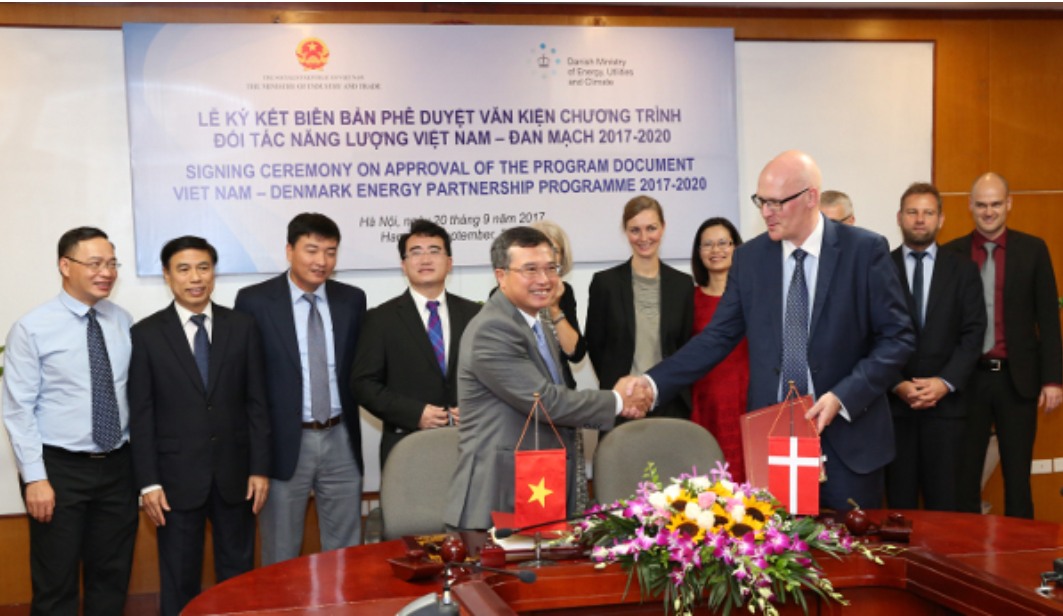 Deputy Minister of Industry and Trade Hoang Quoc Vuong and Mr. Thomas Egebo - State Secretary, Ministry of Energy, Utilities and Climate sign the minutes approving the DEPP document (phase 2017 - 2020)
Deputy Minister of Industry and Trade Hoang Quoc Vuong and Mr. Thomas Egebo - State Secretary, Ministry of Energy, Utilities and Climate sign the minutes approving the DEPP document (phase 2017 - 2020)In order to widely apply low-carbon conversion, cost-optimized opportunities in the energy system in Vietnam, the Ministry of Industry and Trade has cooperated with the The Danish Energy Agency of the Danish Ministry of Climate, Energy and Utilities and the Embassy of Denmark to implement Danish - Vietnamese Energy Partnership Programme(DEPP).
The DEPP is divided into three components including: Component 1: Capacity Building on the Long-term Energy Sector Planning (implemented by the Department of Electricity and Renewable Energy); Component 2: Improving the capacity to integrate renewable energy into the power system (implemented by the Electricity Regulatory Authority of Vietnam); Component 3: Low-carbon development in industry (implemented by Energy Efficiency and Sustainable Development Department).
DEPP (in period of 2017 - 2020) has been successfully implemented. Currently, the Ministry of Industry and Trade is coordinating with the Danish Energy Agency of Danish Ministry of Climate, Energy and Utilities and the Danish Embassy to implement DEPP 3 (in period of 2020 - 2025).
Capacity building on Long-term Energy Sector Planning
The finalization of the energy development policy is a key task in the DEPP. Accordingly, the Vietnam Energy Outlook Report 2019 (EOR19) is an important milestone to support the development of Vietnam's energy system in a more sustainable way through the implementation of optimal policies and cost optimization plan.
The EOR19 presents the results of the study of power and energy development scenarios, policy recommendations on key issues related to the long-term development of electricity and energy systems in Vietnam, providing some input for the formulation of Power Development Plan 8, as well as the National Energy Development Plan of Vietnam.
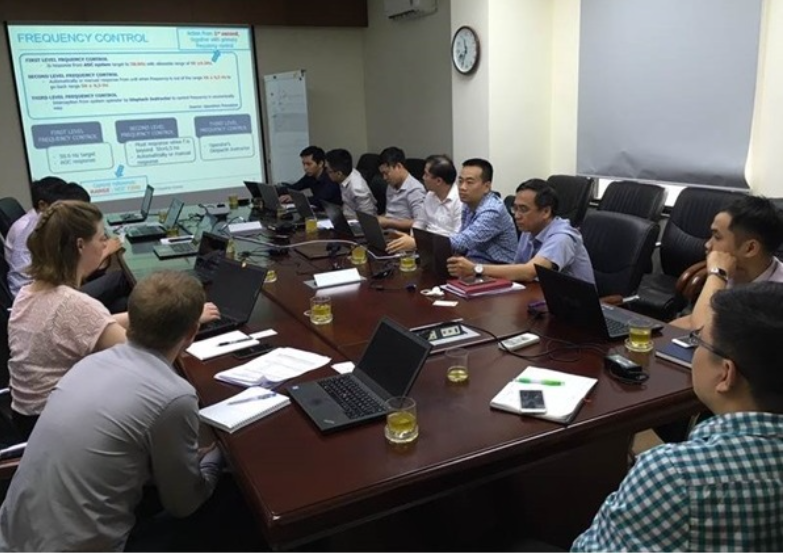 Discussion of experts within the framework of the cooperation program
Discussion of experts within the framework of the cooperation program“One of the most important outcomes of the Programme was the development of the Vietnam Energy Outlook Report. The Energy Outlook Report has provided input to Vietnam's energy policies, such as the National Power Development Plan 8 and the National Energy Master Plan. This will play an important role in the development of Vietnam's energy sector for the next decades.” - said Mr. Nadeem Niwaz Country Manager of DEPP, Danish Energy Agency.
The energy outlook report is built on a solid foundation of data and applies an efficient modeling approach to describe a set of long-term scenarios for the Vietnamese energy system, while also providing policy recommendations on energy sources, energy efficiency, renewable energy, electricity system balance and climate.
Improve capacity to integrate renewable energy into power system
Renewable energy (RE) is known as a kind of green, environmentally friendly and sustainable energy. However, the integration of renewable energy into the power system with traditional power sources such as thermal power, hydroelectricity, etc. is a new task along with many challenges.
According to Mr. Trinh Quoc Vu - Deputy Director General, Department of Energy Efficiency and Sustainable Development, Ministry of Industry and Trade: "Denmark is a developed country with great policy on the use of energy efficiency, a very long-term policy on energy development in general. For example, since 1995, Denmark's energy consumption has decreased, while GDP has grown steadily. It shows the energy efficiency of the Danish.”
With the cooperation and support from the Danish-Vietnamese Energy Partnership Programme, the project has contributed to improving the capacity of predicting the load and electricity output from renewable energy sources; improve the capacity to calculate/quantify demand… thereby contributing to the economic operation of renewable energy sources, minimizing the costs of electricity production and contributing to the reduction of carbon emissions.
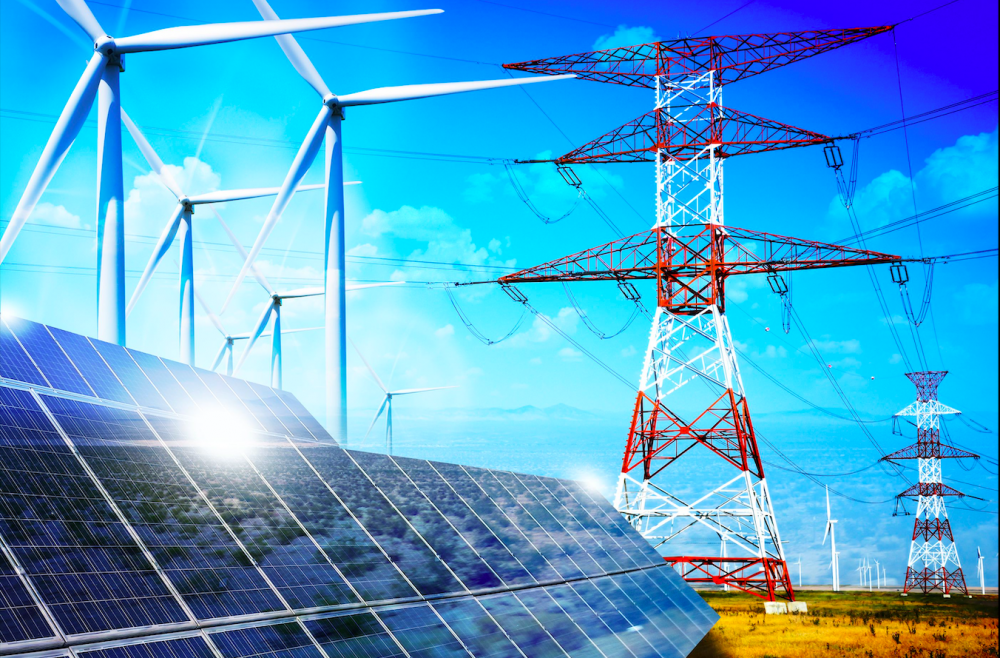 Improve capacity to integrate renewable energy into the power system. (Image: Internet)
Improve capacity to integrate renewable energy into the power system. (Image: Internet)Mr. Nguyen Quoc Trung - Deputy Director of the National Load Dispatch Center, Vietnam Electricity said: "Through seminars as well as training sessions of experts in the DEPP , engineers of the National Load Dispatch Center has mastered the forecasting of renewable energy sources, especially wind and solar power. Engineers are also equipped with knowledge, skills and software tools for stable operation of the national power system in the uncertain context of renewable energy.”
Low carbon development in industry
Enforcing legal policies, improving the quality of energy use is equally important. Resolution No. 55-NQ/TW issued by the Politburo on February 11, 2020 on orientations to the National Energy Development Strategy to 2030, with a vision to 2045, affirmed: “Energy efficiency use and environmental protection must be considered as an important national policy and the responsibility of the whole society.
To achieve that goal, in the past period, the Ministry of Industry and Trade has developed and issued policies to promote the use of energy efficiency in industry and commerce. Specifically, developing and promulgating circulars on energy consumption norms for key, energy-consuming industries such as steel, chemicals, paper, plastic, seafood processing and production of beer and soft drinks.
Within the framework of the cooperation program, the project has supported Bac Giang and Dong Nai provinces to improve the capacity of law enforcement on energy saving. Accordingly, the DEPP has made recommendations on how to improve the implementation of the law on efficient use of energy at the provincial level. Within the framework of cooperation, a set of guidelines for building energy efficiency use plan has been developed to help all 63 provinces and cities of Vietnam to make statistics on energy use and developing local action plans, in order to implement activities on energy efficiency use in the period of 2020 - 2025.
Through the DEPP program, many new documents have also been issued to assist units in making reports more convenient, aggregating data on energy saving, and at the same time to make law enforcement on energy efficiency use better.
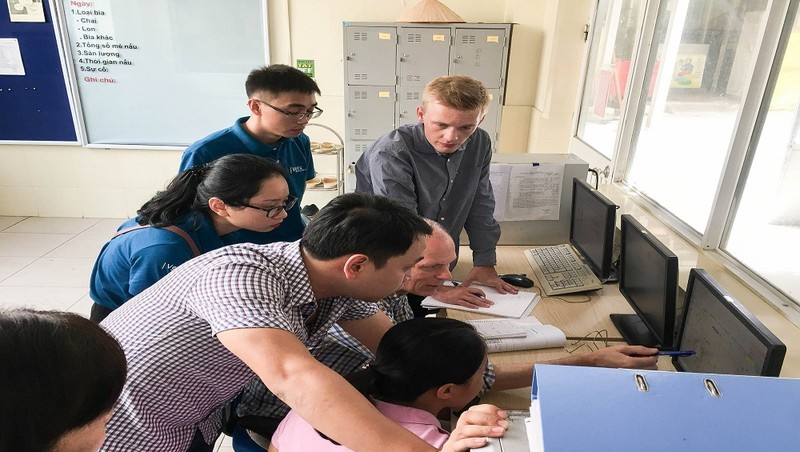 Vietnamese and Danish experts exchange experiences on monitoring energy use in factories.
Vietnamese and Danish experts exchange experiences on monitoring energy use in factories.Mr. Nadeem Niwaz said, they will continue to work closely with the provinces and the Ministry of Industry and Trade in developing tools, forms and processes for local regulators to be able to support enterprises in the industrial sector in deployng projects energy efficiency use. At the same time, they will also make efforts to build an incentive mechanism model for enterprises in the industrial sector and develop a manual of energy-saving technology to support the orientation of enterprises when investing in energy-saving technologies.
According to experts, Vietnam still has a lot of technical potential to reduce loss and waste in energy use, especially in industrial production. Strict implementation of energy audits and annual energy reports will improve law enforcement on the efficiency of energy
Mr. Trinh Quoc Vu said: In the coming time, we will focus on supporting the Department of Industry and Trade to perform the function of management and supervision of key energy-using facilities through the use of a national database system, which can be shared between central and local levels.
“The set of guidelines for the energy efficiency use plan for the period of 2020-2025 has also been sent to all 63 provinces and centrally-run cities across the country for application and implementation of the National Energy efficiency programme for the period 2020-2025 - Mr. Trinh Quoc Vu added.
Through two stages of implementation, the DEPP has brought encouraging results in improving the capacity of energy law enforcement, efficient use of energy, and promoting key energy consumption businesses to innovate their technology.
In the coming period when implementing the DEEP, the project will be developed a legal framework in the offshore wind industry to promote the fast and strong offshore wind industry in Vietnam. At the same time, the project continues to strengthen the grid connection regulations in Vietnam and focus on building the market factors needed to integrate more wind and solar energy into the energy system.
In the industrial sector, the project will develop an incentive mechanism to promote efficient energy use, and at the same time develop an energy-saving technology manual to guide and help businesses in energy saving.
Vietnam's industry is one of the largest energy consuming sectors. Calculations shows, if the current legal regulations are enforced, the industry could save at least 8% of the total current energy consumption annually, by 2025. With the new methods, tools and encouraging policies are based on the Danish's, the energy savings can be achieved.
Currently, 70% of emissions into the environment come from energy consumption. Therefore, saving energy is the way to get a better living environment, ensuring sustainable development. The Danish - Vietnamese Energy Partnership Program is one of the effective tools contributing to the achievement of Vietnam's goal of energy efficiency use.
Some results of DEPP implementation (Phase 2017 - 2020)
Component 1: The Department of Electricity and Renewable Energy has organized seminars on developing Vietnam's Power Production Technology Manual; training courses for Balmorel model analysts and operators (75 certified trainees completed these trainings); Collect data and develop Fuel Price Forecast Report, Energy Demand Forecast Report, which focuses on electricity demand forecast; Collect input data for the TIMES model and the Balmorel model, for the preparation of the Vietnam Energy Outlook Report 2019. Component 2: The Electricity Regulatory Authority organized a workshop to share experiences from Denmark/Europe and Vietnam on forecasting load demand and ensuring the provision of ancillary services; Develop a survey report on improving load forecasting, a survey report on ancillary services for power systems in Denmark and Vietnam. Component 3: Department of Energy Efficiency and Sustainable Development, Ministry of Industry and Trade has coordinated with relevant units to deploy and complete the List of key energy users in 2017 and submit it to the Prime Minister for approval; Collect data and organize consultation workshop on improving energy reporting system according to Circular No. 09/2012/TT-BCT; Collect data and assess the impact of expanding the scope of Decree 21/2011/ND-CP of the Government in the direction of expanding key energy-consuming businesses; Develop tools to assist the Departments of Industry and Trade in improving the implementation of the Law on Efficient Use of Energy in their localities. In which, 02 Departments of Industry and Trade of Bac Giang and Dong Nai provinces were selected to participate in the project. |
Ha Tran







.jpg?w=367&h=206&mode=crop)




.jpg?w=367&h=206&mode=crop) Notice for Contracts award for Support to Industrial Enterprises for Energy Audits and Preparation of Feasibility Studies (Package No. C2.2.4)
04/06/2024
Notice for Contracts award for Support to Industrial Enterprises for Energy Audits and Preparation of Feasibility Studies (Package No. C2.2.4)
04/06/2024
 Training Courses for Energy Managers and Energy Auditors
Training Courses for Energy Managers and Energy Auditors
 Vietnam Energy Outlook Report – Pathway to Net Zero
Vietnam Energy Outlook Report – Pathway to Net Zero
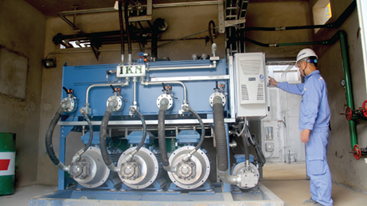 Long Son Cement saves 30% of electricity consumption thanks to heat recovery
Long Son Cement saves 30% of electricity consumption thanks to heat recovery
 Expression of Interest: C2.1.15: Development of Energy-Efficient Technology Catalogs for the Industrial Sector
Expression of Interest: C2.1.15: Development of Energy-Efficient Technology Catalogs for the Industrial Sector
 Optimizing Compressed Air Systems for Southern Industrial Enterprises
Optimizing Compressed Air Systems for Southern Industrial Enterprises
 The Ministry of Industry and Trade Review the Energy Efficiency and Conservation activities in Lao Cai.
The Ministry of Industry and Trade Review the Energy Efficiency and Conservation activities in Lao Cai.
 EOI Extension: C2.2.2: Review and update for current EE benchmarking for 2 sub-industrial sectors
EOI Extension: C2.2.2: Review and update for current EE benchmarking for 2 sub-industrial sectors